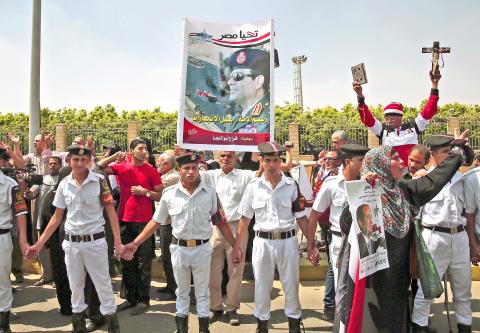A powerful bomb killed Egypt’s top prosecutor as he drove to work Monday morning, broadening the violent insurgency against the government that militants have been waging for two years.
Hisham Barakat is the most senior official to be killed in Egypt since the insurgency began in 2013, after the military ousted the country’s first freely elected president, Mohamed Morsi of the Muslim Brotherhood.
General Osama Bedeir, chief of security in Cairo, said the bomb was in a car parked along Barakat’s route and was probably detonated by remote control.

Photo: AP
The apparently sophisticated mode of attack foiled security measures that were meant to protect a high official who had repeatedly received death threats.
The daylight assassination of so senior a figure was a blow to Egyptian President Abdel-Fattah al-Sisi, who rose to power on a promise to restore stability after years of political tumult. His government has justified a broad crackdown against Islamists and other opponents as necessary to eradicate the threat from militants.
This month, militants carried out separate attacks near the pyramids at Giza and the Karnak temple in Luxor, two of Egypt’s most popular tourist destinations, further denting the government’s efforts to project order.
Monday’s attack appeared to set Egypt on a course for more violence. The killing of Barakat was seen as likely to embolden the militants while prompting an even more forceful response from the security services.
There was no immediate claim of responsibility.
As one of the nation’s most prominent judicial officials, Barakat was a focal point for militant groups vowing retaliation for the prosecutions of hundreds of Islamists and the death sentences handed down against senior Brotherhood leaders, including Morsi.
Many of Barakat’s prosecutions had also been criticized by human rights advocates, who said the cases were built on flimsy evidence and politically motivated charges.
Analysts said the bombing might have been the work of one of a number of militant groups that have surfaced in the last year with smaller-scale attacks.
The emergence of these groups, with names like Revolutionary Punishment, have added to longstanding fears in Egypt that Islamists and other opponents of the government would turn to violence in response to the government’s crackdown.

Kehinde Sanni spends his days smoothing out dents and repainting scratched bumpers in a modest autobody shop in Lagos. He has never left Nigeria, yet he speaks glowingly of Burkina Faso military leader Ibrahim Traore. “Nigeria needs someone like Ibrahim Traore of Burkina Faso. He is doing well for his country,” Sanni said. His admiration is shaped by a steady stream of viral videos, memes and social media posts — many misleading or outright false — portraying Traore as a fearless reformer who defied Western powers and reclaimed his country’s dignity. The Burkinabe strongman swept into power following a coup in September 2022

‘FRAGMENTING’: British politics have for a long time been dominated by the Labor Party and the Tories, but polls suggest that Reform now poses a significant challenge Hard-right upstarts Reform UK snatched a parliamentary seat from British Prime Minister Keir Starmer’s Labor Party yesterday in local elections that dealt a blow to the UK’s two establishment parties. Reform, led by anti-immigrant firebrand Nigel Farage, won the by-election in Runcorn and Helsby in northwest England by just six votes, as it picked up gains in other localities, including one mayoralty. The group’s strong showing continues momentum it built up at last year’s general election and appears to confirm a trend that the UK is entering an era of multi-party politics. “For the movement, for the party it’s a very, very big

ENTERTAINMENT: Rio officials have a history of organizing massive concerts on Copacabana Beach, with Madonna’s show drawing about 1.6 million fans last year Lady Gaga on Saturday night gave a free concert in front of 2 million fans who poured onto Copacabana Beach in Rio de Janeiro for the biggest show of her career. “Tonight, we’re making history... Thank you for making history with me,” Lady Gaga told a screaming crowd. The Mother Monster, as she is known, started the show at about 10:10pm local time with her 2011 song Bloody Mary. Cries of joy rose from the tightly packed fans who sang and danced shoulder-to-shoulder on the vast stretch of sand. Concert organizers said 2.1 million people attended the show. Lady Gaga

SUPPORT: The Australian prime minister promised to back Kyiv against Russia’s invasion, saying: ‘That’s my government’s position. It was yesterday. It still is’ Left-leaning Australian Prime Minister Anthony Albanese yesterday basked in his landslide election win, promising a “disciplined, orderly” government to confront cost-of-living pain and tariff turmoil. People clapped as the 62-year-old and his fiancee, Jodie Haydon, who visited his old inner Sydney haunt, Cafe Italia, surrounded by a crowd of jostling photographers and journalists. Albanese’s Labor Party is on course to win at least 83 seats in the 150-member parliament, partial results showed. Opposition leader Peter Dutton’s conservative Liberal-National coalition had just 38 seats, and other parties 12. Another 17 seats were still in doubt. “We will be a disciplined, orderly